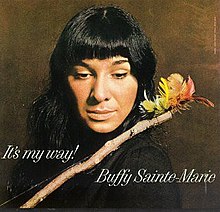| It's My Way! | ||||
|---|---|---|---|---|
 | ||||
| Studio album by | ||||
| Released | April 1964 [1] [2] | |||
| Genre | Folk | |||
| Length | 40:35 | |||
| Label | Vanguard | |||
| Producer | Maynard Solomon | |||
| Buffy Sainte-Marie chronology | ||||
| ||||
It's My Way! is the first studio album by the folk musician Buffy Sainte-Marie. It was released in April 1964 through Vanguard Records. [1] [2] It was later released in Britain in early 1965 by Fontana Records. [3] [4] The album would become influential in the folk community. It is most famous for two widely covered folk standards, "Universal Soldier" and "Cod'ine", as well as "Now That the Buffalo's Gone", a lament about the continued confiscation of Indian lands, as evidenced by the building of the Kinzua Dam. The cover features a mouthbow, which was to be a trademark of her sound on her first three albums.
Contents
In 2016, It's My Way! was inducted by the Library of Congress into the National Recording Registry. [5]
In 2020 the album was named as one of two jury vote winners, alongside Main Source's Breaking Atoms , of the Polaris Heritage Prize at the 2020 Polaris Music Prize. [6] This award was rescinded in 2025, following the revocation of Sainte-Marie's membership in the Order of Canada. [7]